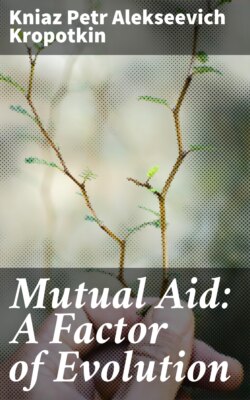Mutual Aid: A Factor of Evolution

Реклама. ООО «ЛитРес», ИНН: 7719571260.
Оглавление
kniaz Petr Alekseevich Kropotkin. Mutual Aid: A Factor of Evolution
Mutual Aid: A Factor of Evolution
Table of Contents
INTRODUCTION
CHAPTER I
MUTUAL AID AMONG ANIMALS
NOTES:
CHAPTER II
NOTES:
CHAPTER III
MUTUAL AID AMONG SAVAGES
NOTES:
CHAPTER IV
MUTUAL AID AMONG THE BARBARIANS
NOTES:
CHAPTER V
MUTUAL AID IN THE MEDIAEVAL CITY
NOTES:
CHAPTER VI
NOTES:
CHAPTER VII
MUTUAL AID AMONGST OURSELVES
NOTES:
CHAPTER VIII
NOTES:
CONCLUSION
Отрывок из книги
kniaz Petr Alekseevich Kropotkin
Published by Good Press, 2019
.....
In that immense division of the animal kingdom which embodies more than one thousand species, and is so numerous that the Brazilians pretend that Brazil belongs to the ants, not to men, competition amidst the members of the same nest, or the colony of nests, does not exist. However terrible the wars between different species, and whatever the atrocities committed at war-time, mutual aid within the community, self-devotion grown into a habit, and very often self-sacrifice for the common welfare, are the rule. The ants and termites have renounced the "Hobbesian war," and they are the better for it. Their wonderful nests, their buildings, superior in relative size to those of man; their paved roads and overground vaulted galleries; their spacious halls and granaries; their corn-fields, harvesting and "malting" of grain;(8) their, rational methods of nursing their eggs and larvae, and of building special nests for rearing the aphides whom Linnaeus so picturesquely described as "the cows of the ants"; and, finally, their courage, pluck, and, superior intelligence—all these are the natural outcome of the mutual aid which they practise at every stage of their busy and laborious lives. That mode of life also necessarily resulted in the development of another essential feature of the life of ants: the immense development of individual initiative which, in its turn, evidently led to the development of that high and varied intelligence which cannot but strike the human observer.(9)
If we knew no other facts from animal life than what we know about the ants and the termites, we already might safely conclude that mutual aid (which leads to mutual confidence, the first condition for courage) and individual initiative (the first condition for intellectual progress) are two factors infinitely more important than mutual struggle in the evolution of the animal kingdom. In fact, the ant thrives without having any of the "protective" features which cannot be dispensed with by animals living an isolated life. Its colour renders it conspicuous to its enemies, and the lofty nests of many species are conspicuous in the meadows and forests. It is not protected by a hard carapace, and its stinging apparatus, however dangerous when hundreds of stings are plunged into the flesh of an animal, is not of a great value for individual defence; while the eggs and larvae of the ants are a dainty for a great number of the inhabitants of the forests. And yet the ants, in their thousands, are not much destroyed by the birds, not even by the ant-eaters, and they are dreaded by most stronger insects. When Forel emptied a bagful of ants in a meadow, he saw that "the crickets ran away, abandoning their holes to be sacked by the ants; the grasshoppers and the crickets fled in all directions; the spiders and the beetles abandoned their prey in order not to become prey themselves;" even the nests of the wasps were taken by the ants, after a battle during which many ants perished for the safety of the commonwealth. Even the swiftest insects cannot escape, and Forel often saw butterflies, gnats, flies, and so on, surprised and killed by the ants. Their force is in mutual support and mutual confidence. And if the ant—apart from the still higher developed termites—stands at the very top of the whole class of insects for its intellectual capacities; if its courage is only equalled by the most courageous vertebrates; and if its brain—to use Darwin's words—"is one of the most marvellous atoms of matter in the world, perhaps more so than the brain of man," is it not due to the fact that mutual aid has entirely taken the place of mutual struggle in the communities of ants?
.....